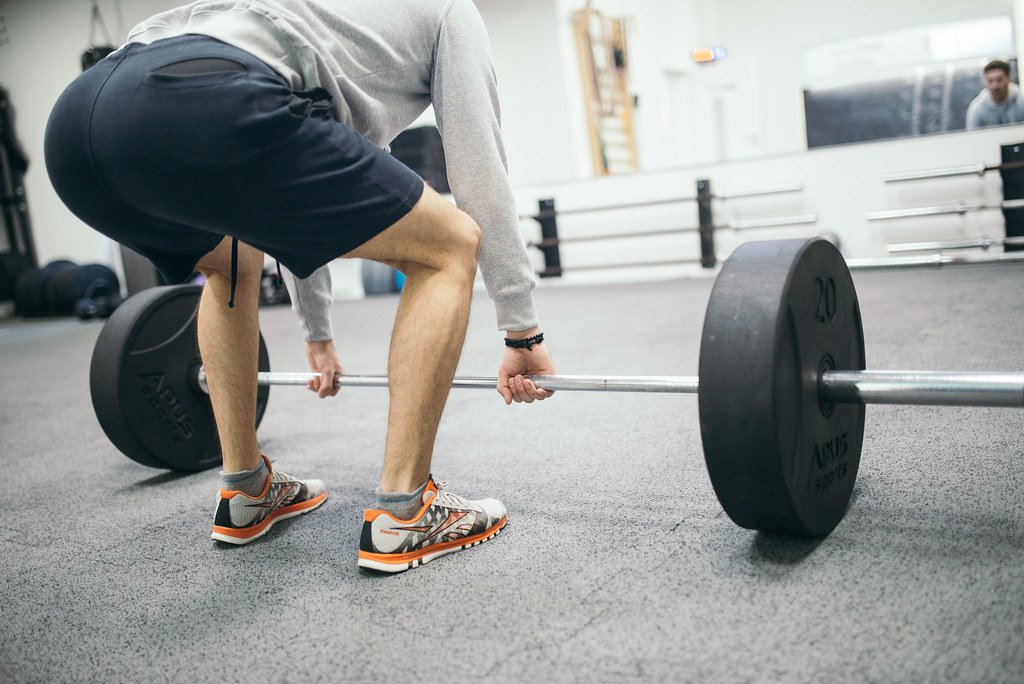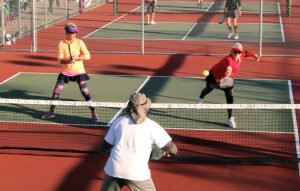As the sun rises over the pickleball courts, casting a golden hue on the freshly painted lines, enthusiasts gather to engage in their beloved sport. The rhythmic sound of paddles striking the lightweight plastic balls fills the air, accompanied by laughter, shouts of triumph, and occasional cries of defeat. Pickleball, a sport that combines elements of tennis, badminton, and ping-pong, has captured the hearts of many with its fast-paced nature and social camaraderie. Amidst this vibrant pickleball culture, a surprising ally has emerged – the humble bicycle. While cycling may seem unrelated to the paddle-wielding warriors on the court, it brings forth a myriad of benefits that can enhance the performance and overall well-being of pickleball players. So, hop on your bike, pedal with purpose, and discover how this seemingly unconventional pairing can unlock a world of advantages for pickleball enthusiasts.
Table of Contents
- The Benefits of Cycling for Pickleball Players:
- – Enhancing Cardiovascular Health and Endurance
- – Strengthening Lower Body Muscles for Improved Performance
- – Facilitating Active Recovery and Reducing Pickleball-Related Injuries
- – Amplifying Mental Focus and Concentration
- – Cross-Training with Cycling: Key Recommendations
- Q&A
- The Way Forward

The Benefits of Cycling for Pickleball Players:
Cycling is an excellent sport that can significantly benefit pickleball players. It offers a multitude of advantages that can improve their overall game and enhance their physical well-being.
Firstly, cycling is a low-impact, cardiovascular activity that helps improve endurance. Regular cycling sessions can enhance a player’s stamina, enabling them to play longer and more intensely during pickleball matches. It strengthens the heart and lungs, leading to better oxygen delivery throughout the body.
Secondly, cycling is a fantastic cross-training activity for pickleball players. It engages different muscles than those used in the game, providing well-rounded fitness. Cycling helps strengthen the legs, hips, and core, which can significantly enhance a player’s agility, stability, and speed on the pickleball court. Additionally, it promotes better balance and posture, contributing to improved overall body control and technique.
Moreover, cycling offers mental benefits that can positively impact pickleball performance. It is a stress-relieving activity that allows players to clear their minds and focus on the present moment. The rhythmic motion of pedaling can be meditative, reducing anxiety and improving mental clarity. Furthermore, cycling outdoors exposes players to fresh air and nature, promoting a sense of well-being and overall mental rejuvenation.

– Enhancing Cardiovascular Health and Endurance
Enhancing Cardiovascular Health and Endurance
One of the key components of maintaining a healthy lifestyle is enhancing cardiovascular health and endurance. A strong cardiovascular system not only improves overall fitness but also plays a crucial role in preventing various heart-related diseases. Here are some effective strategies to boost your cardiovascular health:
- Aerobic Exercise: Regularly engaging in aerobic activities such as running, swimming, cycling, or dancing can greatly improve your cardiovascular function. These exercises increase your heart rate, strengthen your heart muscle, and improve blood circulation throughout your body.
- Interval Training: Incorporating high-intensity interval training (HIIT) into your workout routine can significantly enhance your endurance. By alternating between short bursts of intense exercises and short recovery periods, you challenge your cardiovascular system and increase its capacity to handle stress.
- Proper Nutrition: A balanced diet rich in fruits, vegetables, lean proteins, whole grains, and healthy fats not only helps manage weight but also protects your cardiovascular health. Consuming foods that are low in saturated and trans fats, cholesterol, and sodium can lower the risk of heart diseases and promote good overall health.
By implementing these strategies into your lifestyle, you can optimize your cardiovascular health, increase your endurance, and enjoy the numerous benefits that come with a strong and efficient cardiovascular system.

– Strengthening Lower Body Muscles for Improved Performance
Strengthening Lower Body Muscles for Improved Performance
When it comes to athletic performance, having a strong lower body is crucial. Whether you’re a runner, soccer player, or a gym enthusiast, targeting and strengthening your lower body muscles can greatly enhance your performance and overall fitness level.
Here are some exercises that specifically target the lower body muscles:
- Squats: Squats are a powerful way to engage your glutes, quadriceps, and hamstrings. Start with your feet shoulder-width apart, bending your knees and lowering your hips as if you’re sitting on an imaginary chair. Keep your chest up, back straight, and extend your arms forward for balance. Repeat this motion for multiple sets.
- Lunges: Lunges target your glutes, quadriceps, and calves. Take a step forward with your right foot, lower your body until both knees are bent at a 90-degree angle, and then push back up to the starting position. Repeat with the other leg. To intensify the exercise, hold dumbbells in each hand or add variations like walking lunges.
- Calf Raises: Calf raises primarily focus on the calf muscles. Stand with your feet hip-width apart and slowly rise onto the balls of your feet. Hold for a few seconds, then lower back down. For an added challenge, try doing calf raises on an elevated surface like a step.
- Glute Bridges: This exercise targets your glutes and strengthens your lower back. Lay flat on your back with your knees bent, feet flat on the floor. Lift your hips off the ground until your body forms a straight line from knees to shoulders. Squeeze your glutes at the top and hold for a few seconds before lowering back down.
Incorporating these exercises into your training routine can help you build strength, balance, and stability in your lower body. Remember to listen to your body, start with lighter weights or bodyweight exercises, and gradually increase the intensity as you progress. By consistently working on strengthening your lower body muscles, you’ll notice improved performance and overall athletic ability!
– Facilitating Active Recovery and Reducing Pickleball-Related Injuries
In order to ensure a safe and enjoyable experience on the pickleball court, it is essential to prioritize active recovery and injury prevention. By implementing certain strategies and techniques, players can mitigate the risk of pickleball-related injuries and enhance their overall performance.
One way to facilitate active recovery is to incorporate dynamic warm-up exercises before playing pickleball. These exercises help to increase blood flow, improve flexibility, and prepare the muscles and joints for the physical demands of the sport. Some effective warm-up exercises include leg swings, arm circles, and lunges, which can be performed in a controlled and rhythmic manner.
Additionally, it is crucial to incorporate rest and recovery time into your pickleball routine. Taking breaks between games or matches allows the body to recover and prevents overuse injuries. During these breaks, consider engaging in light stretching or using a foam roller to relieve muscle tension. Remember to listen to your body and take breaks when needed, as pushing through fatigue or pain can lead to injury.
Furthermore, incorporating cross-training exercises into your fitness regimen can help to strengthen different muscle groups and prevent muscle imbalances. Activities such as swimming, cycling, or Pilates can complement your pickleball training and reduce the risk of overuse injuries. Varying your workouts and incorporating different forms of exercise not only prevents boredom but also helps to build overall strength and resilience.
By prioritizing active recovery, incorporating rest and recovery time, and diversifying your training routine, you can reduce the risk of pickleball-related injuries and enhance your performance on the court. Remember, safety should always be the top priority to ensure a long and enjoyable pickleball journey.
– Amplifying Mental Focus and Concentration
Amplifying Mental Focus and Concentration
In today’s fast-paced world, maintaining optimal mental focus and concentration can be a challenge. Luckily, there are various strategies and techniques that can help enhance these cognitive faculties. By incorporating them into your daily routine, you can sharpen your mind and achieve better productivity.
1. Mindfulness meditation: Practicing mindfulness meditation can significantly improve your ability to focus and concentrate. By redirecting your attention to the present moment, you train your mind to avoid distractions and stay in the here and now. Regular meditation sessions cultivate a sense of mental clarity and composure, allowing you to tackle tasks with heightened focus.
2. Proper sleep and rest: Restful sleep is crucial for concentration and mental agility. Ensure you get an adequate amount of sleep each night to recharge your brain and optimize cognitive functions. Additionally, taking short breaks throughout the day can help prevent mental fatigue and maintain sustained focus.
3. A balanced diet and hydration: Fueling your mind with the right nutrients is essential for optimal brain function. Incorporate foods rich in omega-3 fatty acids, antioxidants, and vitamins into your diet. Remember to stay hydrated throughout the day as even mild dehydration can impair cognitive performance.
4. Practice single-tasking: Contrary to popular belief, multitasking can hinder focus and decrease productivity. Instead, try single-tasking, where you focus on one task at a time. This approach allows for deeper engagement and concentration, enabling you to complete tasks more efficiently.
5. Cognitive exercises: Engaging your brain in activities that challenge your cognitive abilities can help improve focus and concentration. Solving puzzles, playing strategic games, and learning new skills keep your mind active and enhance mental sharpness.
Incorporating these strategies into your daily routine can have a profound impact on your mental focus and concentration. Remember, developing these skills is an ongoing process, so be patient and consistent in your efforts. With practice and dedication, you can amplify your mental faculties and excel at whatever you set your mind to.
– Cross-Training with Cycling: Key Recommendations
When it comes to cross-training with cycling, there are several key recommendations that can help you maximize your fitness gains and make the most out of your workouts. Whether you are a seasoned cyclist or just starting out, incorporating cycling into your cross-training routine can provide a wide range of benefits for your overall fitness and performance.
- Vary the terrain: Exploring different types of terrain and inclines can challenge your body in new ways and help you build strength and endurance. Try incorporating uphill climbs, flat stretches, and even off-road trails into your cycling routine to keep things interesting.
- Adjust your bike fit: Ensuring proper bike fit is essential to prevent injuries and optimize your performance. Take the time to adjust your saddle height, handlebar position, and other bike components to ensure a comfortable and efficient riding position.
- Include interval training: Incorporating interval training into your cycling workouts can help improve your cardiovascular fitness and build speed. Try alternating between high-intensity efforts and periods of active recovery to challenge your body and boost your cycling performance.
- Don’t forget strength training: While cycling is an excellent cardiovascular exercise, it’s important to complement it with strength training to build muscular strength and prevent imbalances. Incorporate exercises targeting your core, upper body, and lower body to maintain overall body strength and stability.
- Listen to your body: As with any form of training, it’s crucial to listen to your body and adjust your workouts accordingly. Pay attention to any signs of fatigue or discomfort and don’t hesitate to take rest days or modify your training schedule as needed.
Remember, cross-training with cycling can be an exciting and effective way to enhance your fitness journey. By following these key recommendations, you can make the most out of your cycling workouts and achieve your fitness goals.
Q&A
Why should pickleball players consider cycling?
Cycling is a low-impact exercise that helps improve cardiovascular fitness, leg strength, and endurance, all of which are essential for pickleball players. It also provides a mental break from the fast-paced nature of the game.
Can cycling benefit pickleball players’ overall fitness?
Absolutely! Cycling is a fantastic way to boost overall fitness. It increases stamina, builds muscle strength, improves balance and coordination, and aids in weight management. These benefits can translate into better performance on the pickleball court.
How does cycling enhance cardiovascular health for pickleball players?
Cycling is a fantastic cardiovascular workout. It elevates heart rate, improves lung function, and enhances blood circulation. Regular cycling can help pickleball players improve their endurance and maintain a higher level of energy throughout matches.
What muscle groups does cycling strengthen that are helpful in pickleball?
Cycling primarily targets the leg muscles, including the quadriceps, hamstrings, glutes, and calves, which are all crucial for pickleball performance. Additionally, the core, back, and arm muscles are also engaged to maintain balance and stability while cycling.
Does cycling help with injury prevention in pickleball?
Yes, cycling is a low-impact exercise that places minimal stress on joints, reducing the risk of injuries commonly associated with high-impact activities. Regular cycling can help develop stronger bones, ligaments, and tendons, making pickleball players less prone to common injuries.
Can cycling improve the mental focus of pickleball players?
Cycling can indeed boost mental focus for pickleball players. As an outdoor activity, it provides a change of scenery, fresh air, and a temporary respite from the intensity of the game. This, in turn, promotes mental relaxation, reduces stress, and enhances concentration on and off the pickleball court.
How often should pickleball players incorporate cycling into their routine?
The frequency of cycling depends on individual preferences and fitness levels. Ideally, pickleball players should aim for at least three to four cycling sessions per week, with each session lasting around 45 minutes to an hour. Adjusting the frequency and duration based on personal goals and schedules is suggested.
Are there any special precautions pickleball players should take when cycling?
It is crucial for pickleball players to wear appropriate safety gear, including a well-fitted helmet, to protect themselves from potential accidents. Additionally, ensuring the bike is in good working condition, practicing proper road etiquette, and staying aware of surroundings can make cycling a safe and enjoyable activity.
The Way Forward
As the wheels of your bike come to a gentle stop, you dismount with a sense of accomplishment. The wind tousles your hair, and a satisfying burn lingers in your legs. You can’t help but smile, knowing that your time on two wheels has elevated your pickleball game to new heights.
Cycling and pickleball, two distinct sports that share little in common at first glance, have proven to be an unlikely pairing that brings numerous benefits to the court. From the moment your feet hit the pedals, a unique synergy ignites within your body, blending the best of both worlds.
As you breeze down the open road, your cardiovascular system comes alive. Your heart pounds with determination, propelling oxygen-rich blood to every muscle, preparing them for the explosive movements ahead on the pickleball court. The increased endurance gained from cycling not only enhances your stamina but also empowers you to outlast opponents, leaving them breathless and in awe.
Pedaling through picturesque landscapes, your leg and core muscles transform into lean, mean powerhouses. The vigorous yet low-impact nature of cycling strengthens these muscles without overtaxing joints, establishing a sturdy foundation for your pickleball game. With each swing of the paddle, you unleash a newfound strength and stability, allowing for precise shots and swift returns.
But it’s not just your body that benefits from this unlikely union. Cycling takes you on a journey through uncharted territories, refreshing and invigorating your mind. As the scenery changes, your imagination flourishes, igniting creativity on and off the court. The freedom experienced while cycling translates seamlessly into your pickleball game, enabling you to think outside the box and execute bold strategies that leave opponents dumbfounded.
And let’s not forget about the undeniable camaraderie that forms amongst fellow cyclists. Sharing tales of challenging climbs and scenic routes with like-minded individuals fosters a sense of belonging and support that transcends onto the pickleball court. The sense of community gained from cycling creates an atmosphere of encouragement and friendly competition, as you and your newfound cycling companions spur each other on to reach new heights in pickleball.
So, my fellow pickleball players, let us embark on this thrilling adventure together. Strap on your helmet, lace up your shoes, and grab that paddle. Trust in the power of cycling to elevate your game, and watch as this unconventional union becomes the secret ingredient to your pickleball success. Remember, the benefits of cycling for pickleball players are boundless, and the journey has just begun.
As an affiliate, my content may feature links to products I personally use and recommend. By taking action, like subscribing or making a purchase, you’ll be supporting my work and fueling my taco cravings at the same time. Win-win, right?
Want to read more? Check out our Affiliate Disclosure page.




